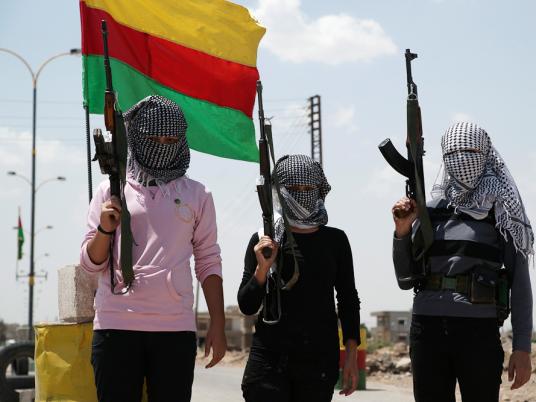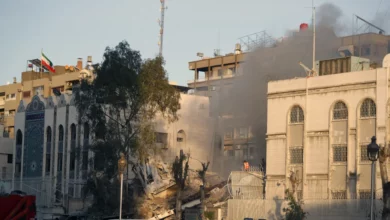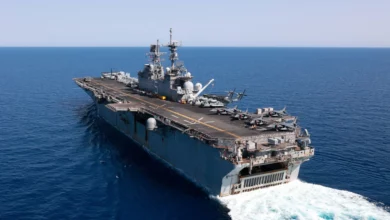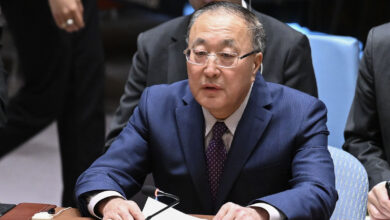
DERIK, Syria — The Kurdish rebellion in northeastern Syria intensified in fighting that erupted Saturday 22 July, as militias raising the slogan “Free Kurdistan” swarmed police stations and military outposts across the region.
The rebels have been preparing and training with the support of Turkish members of the Kurdistan Workers Party, or PKK, and Iraqi Kurdish fighters, according to Egypt Independent’s sources.
In the town of Derik, militias from the People’s Defense Union, known as the YPG, appeared well-trained for the fighting — 150 fighters captured 30 Syrian army soldiers. One YPG fighter was killed as soldiers barricaded themselves inside a military building, returning fire and refusing to surrender until rocket-propelled grenade launchers were brought.
In a coordinated move that followed escalating fighting in Damascus earlier in the week, YPG forces also overtook the cities of Girke Lege, Kubani, Efrin and Amude last Saturday, with barely a fight. Syrian police were arrested, soldiers disarmed and government buildings occupied in the YPG’s first operation.
Yet this armed rebellion follows a deeper-rooted cultural rebellion that began when the revolt against President Bashar al-Assad in other areas of Syria drained soldiers, police and security forces in the region. It also rests on years of persecution and struggle — and an extensive smuggling network.
Kurdish interests
Smugglers’ routes from Iraqi Kurdistan to the predominantly Kurdish area in northeastern Syria crosses land with little cover, deep rivers to ford and border guards on both sides. Even at night, the temperature reaches 30 degrees Celsius. Weapons and money flow along these routes from Iraq to Syria, while Kurdish refugees, threatened by Assad, pass in the opposite direction.
Before the outbreak of fighting on Saturday, the YPG was armed with AK-47 assault rifles and rocket-propelled grenades. Now, having taken over Syrian army outposts, they have access to heavier, vehicle-mounted weapons, such as a 106 mm cannon.
Among the border guards on the Iraqi side are Peshmerga, the Kurdish fighters who secure northern Iraq. The official policy of the Kurdistan Regional Government in Iraq is to oppose all arms smuggling to Syria. Kurdish authorities also want to prevent the infiltration of Sunni Arab fighters associated with the Free Syrian Army.
The YPG also ensures that no Free Syrian Army forces enter their territory. The Kurds do not want to be dragged into the bloody conflict between it and the Syrian army — they fear an Islamist government will replace the secular regime, and that Turkey will expand its influence in Syria, once again choking off the hope for greater Kurdish autonomy.
Under Assad, the Kurds — who constitute more than 10 percent of the population and are the largest minority in the country — always had second-class status. They were neither allowed to teach their own language nor cultivate their traditions. Behavior violating these rules could result in a 10-year prison sentence.
The Kurdish population has been deliberately kept impoverished. Land was leased to Arab landowners, oil fields were taken from them by the state and roads were left in disrepair. In addition, 300,000 Kurds were deprived of citizenship.
Since the start of the uprising in Syria, the Kurds have given priority to safeguarding their own interests. Although demonstrations were held, direct attacks against the offices of the Assad regime were rejected, until now.
A cultural revolution
As the Syrian regime concentrated its bloody repression on the rebellions in the Arab territories, the Kurdish movement Tev-Dem, an umbrella organization of all Kurdish organizations in Syria, expanded their influence. Step by step, cultural centers have been established and Kurdish language schools opened.
Aysha Afendi, a longtime political activist, was elected to a Kurdish local parliament in elections autonomously organized by Tev-Dem in March, independent of the Syrian authorities.
“Kurdish people have been fighting for 30 years to protect their identity under Assad,” she said. “There were a lot of arrests during that time. I was in prison for a year in Aleppo for my political work. In the town of Kubani alone, there have been 250 martyrs since 1990.”
She estimates that two-thirds of them died fighting alongside the PKK in Turkey, while the remaining third died in Syria, either while fighting or in Assad’s prisons.
“Before you can change the government and the system collapses, the population must first be organized, and the Baathist mindset must be changed,” said Aldar Khalil, one of the three chairmen of the Tev-Dem. “The Tev-Dem knows that it not only has to deal with the Assad regime, but also with neighboring countries such as Turkey, which suppress the local Kurdish population. Of course we are against the government and the bloodshed, but we are fighting for Kurdish rights as well and will not give up one for the other.”
Their fears are not groundless. Thus far, the Syrian National Council, which is recognized in the West as the “official” opposition organization, has so far rejected support for enhanced Kurdish rights. So the Kurds in Syria are trying to formulate a third position.
On one hand, they are resisting Assad and his regime. On the other, they are preparing for a possible civil war with the forces represented by the Free Syrian Army after the fall of Assad.
In particular, Kurdish women fear the empowerment of conservative Islamists.
“We are trying to organize ourselves and to strengthen the women’s movement — not only among Kurds, but also among Christians, Arabs and Alawites. For if the Arab opposition should come to power, it would be especially dangerous for us women,” claimed Amara Kocher, a dance instructor at the newly built cultural center in the village of Bestasos in northeastern Syria.
For their part, the Arab opposition in the rest of the country criticizes the Kurds for failing to attack the oil production installations in their area, which are strategically vital for Assad. Kurdish forces apparently fear reprisal attacks. However, since 25 July, the YPG has controlled the oil fields around Derik. The city of Swedy, around 16km south of Derik and an important site for the gas industry, is also under the control of the YPG and Tev-Dem. But the city of Rmelan, 28km west of Derik, with its surrounding large oil fields, is still under the control of Assad's forces.
Open rebellion
In the past fortnight, the establishment of Kurdish organizations intensified, and the number of demonstrations increased. Almost every day there were protests against Assad in towns and villages, often under the banner of freedom for Kurdistan. Swaths of the Kurdish areas — parts of the country along the northwest and northeast borders with Turkey — are now out of Assad’s control.
However, it is unclear how long this situation will last. Assad's forces are holed up in Rmelan, just 28km from Derik.
There have been battles in Qamishlo as well, the largest Kurdish city in Syria, killing one, Riad Majid Sheikhmous. Several were wounded when regime soldiers attacked an unarmed Kurdish checkpoint at the city’s edge. In smaller towns, Syrian policemen and soldiers are holed up in their buildings, making any surprise attack impossible.
The women in the newly established Kurdish women’s center in Derik — the first of its kind in the area — consider the danger of civil war to be increasing.
“We are preparing ourselves to assist the community in a civil war. Every woman here can now provide first aid assistance and handle a weapon. We do not want to be victims like the women and families in Homs and Idlib,” one woman from the center said. “We were once regarded almost as slaves, second-class citizens in this Arab country. Now we have, in the course of the revolution, the possibility to change all that. And we will seize this opportunity.”




